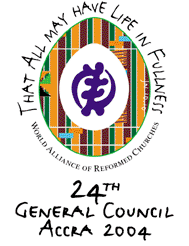Confessing Truth II: Resources to Point the Way
 In a confessional crisis, movement to a more faithful stance requires finding and naming the root cause, the source, from which the crisis emerged. The source for US Mainline Protestant belief is the not-yet-resolved conflict about slavery in the US, a truth-denying, death-dealing intramural disagreement that continues to wreak havoc and incite violence, while creating vast difficulty for Christians to discuss issues that matter.
In a confessional crisis, movement to a more faithful stance requires finding and naming the root cause, the source, from which the crisis emerged. The source for US Mainline Protestant belief is the not-yet-resolved conflict about slavery in the US, a truth-denying, death-dealing intramural disagreement that continues to wreak havoc and incite violence, while creating vast difficulty for Christians to discuss issues that matter.
The creation of space within practices understood as Christian of kidnapping, imprisoning, transporting, selling, devaluing and buying people and stealing their labor under the very real threat of violence and loss of life — components of the trans-Atlantic slave trade — this has grievously distorted mainline Protestant theology, ministry and practice. We have not yet recovered from the injury sustained.
Church-going believers, pastors, Biblical scholars and theologians differed on the question of whether slavery was acceptable within Christian practice. This difference of opinion led to schism in the major Protestant churches of the antebellum period. The schisms that rent Protestant churches before the US Civil War[1], including Methodists, Baptists, and Presbyterians, were all based in opposed understandings of slavery as acceptable or not within Christian practice. Among these, Presbyterian scholars and theologians took the lead in developing ideological arguments contending that slavery was not only acceptable, but obligatory for faithful people.
The false foundation of slavery-as-part-of-faithful-discipleship, on which the church in the US was built and which has not yet been renounced, confessed, nor repented in order to move toward reconciliation – this has led to a church built on a faulty footing. In US society, this ideology has helped create a pernicious pattern of developing the needed-and-feared other – those about whom we are willing to construct lies, those we rely upon and suspect, those whose labor we use and whom we write laws to control, and those from whom we feel we must protect ourselves. While women were the first occupants of this category, US history is replete with other examples: indigenous peoples of the Americas, enslaved people, Irish and Italian people, Jews, Japanese Americans, Chinese immigrants, Mexicans and immigrants from across Latin America, and Muslims – to name a few. Biblical teachings have been, and in some areas, continue to be weaponized, in order to protect the powerful and ensure that those without power would remain so. False views of people and distorted Biblical understanding are sufficiently strong in our collective consciousness that even when we know the truth, we are lackluster in its defense, as we misguidedly work to make or keep “peace” with those who do not yet know the truth – or who work to deny it. This dims our collective capacity to see and recognize truth, and co-opts us in continuing to lie – which transforms the brain to make lying feel easier over time. Turning from untruth is therefore both urgent and very difficult. In a time when US Christians conflict about global climate change, gun violence, sexuality and gender identity, a wide variety of international issues, the role of women, immigration, and whether movements like #BlackLivesMatter and #NoDAPL[2] concern people of faith, confessing truth will take deep reflection, research, prayer, and community conversation.
The growing confessional library of the church provides resources for this crucial work. Many have suggested that the times call for confessing truth for our day. It is my hope that the development of new confessions, whenever that comes about, will not take attention from existing confessions – which have much to say to the church in the US, which often suffers from a lack of humility and a willingness to disregard the voices of others.
I share here concepts from 20th century confessions. I offer suggestions largely from Reformed confessions, and encourage others to offer ideas from other parts of this treasure chest. My purpose is not to explore all the riches in the library – but rather to encourage reading the confessions both within and outside your tradition, to see what might assist you in your work in preserving, claiming/proclaiming and confessing truth.
Resources for Confessing Truth
The Constitution of the Presbyterian Church (U.S.A.) includes resources about the nature of confessions that have proven helpful to those working to confess in their time. The Preface and the Confessional Nature of the Church Report in Part I (Book of Confessions) and F-1 and F-2 sections in Part II (Book of Order) are good reference material.[3] Other communions have published like resources, which could profitably be studied by those seeking to confess truth.
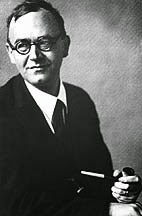
The Theological Declaration of Barmen
Written in a time when Christians, congregations, pastors and communions confused the authority of God, the authority of the state, and the relationship between the two, this four-page declaration is required reading for anyone considering confessing truth in our time. Emerging as the Third Reich took power in Germany in the 1930s, Barmen spoke into a context when for many, patriotism and faith in Jesus were equated and understood to be mutually-supportive of each other. (Sounding familiar?) The Declaration names “alien principles” that have put the confession of the church in peril, and rejects false doctrines that make the church an organ of the State.
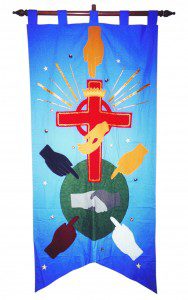
The Confession of 1967
Born in a time of great social upheaval, “C-67” calls Christians to understand the great responsibility of disciples to answer Christ’s call to take part in Christ’s work of reconciliation. Its opening statement could serve any group of disciples seeking to confess truth.
The church confesses its faith when it bears a present witness to God’s grace in Jesus Christ. In every age the church has expressed its witness in words and deeds as the need of the time required.[4]
C-67 is not built on the systematic model of many of the Reformation confessions, focusing more narrowly on its subject of reconciliation in Christ. It takes a clear stance against the wisdom of the world, which encourages the categorization of people into two groups: winners or losers – as those who are in or those who are out. Four arenas of life crying out for reconciliation – race, relations between men and women, the environment (C-67 is one of the first confessional statements to include concern for creation), and relations between nations (moving from the making of war to the making of peace) – are explored. These foci made this confession controversial, a status which continues today. Written in the 1960s, a time of great division, the wisdom of this confession can offer those seeking to speak truth in our divided era both encouragement and instruction.
The Confession of Belhar
Emerging from the violent crucible of apartheid in South Africa, the Confession of Belhar was a product of the Dutch Reformed Mission Church (DRMC) the “coloured” church within the Dutch Reformed Church (DRC) of South Africa chartered under their policy of separate mission development – the practice, begun in the 19th century, of segregated church development. In enacting this policy, the DRC made their complicity with racial prejudice and division official and public.
The DRMC operated under the authority of the DRC. As the second tier in the four basic levels (from most privileged to most oppressed) under apartheid law, “coloured” people were subject to most legal restrictions. The DRC put restrictions in place for their mission churches, as well, controlling what they could do and how they could do it. Belhar thus is a confession from below – written by people and living and ministering under oppression.
The Confession of Belhar is Trinitarian and is built around three themes – unity, reconciliation, and justice. Belhar states that the church is called to pursue unity. It proclaims that partnering in Christ’s life-giving work of reconciliation is foundational for disciples, and that the credibility of this message [of reconciliation] is seriously affected and its beneficial work obstructed when it is proclaimed in a land which professes to be Christian, but in which the enforced separation of people on a racial basis promotes and perpetuates alienation, hatred and enmity.
Finally, the Confession argues that God wants to bring about justice, and “in a world full of injustice and enmity, is in a special way the God of the destitute, the poor and the wronged”, and that the church “must stand where the Lord stands, against injustice and with the wronged”. For those who seek to confess truth in troubled times, the Confession of Belhar offers much help.
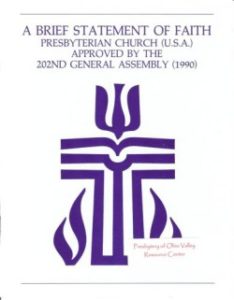
The Brief Statement of the Reformed Faith
The Brief Statement came about after the reunion of the Presbyterian Church US (the “Southern” Presbyterian Church) and the United Presbyterian Church in the USA (the “Northern” Presbyterian Church), which had been apart since the start of the US Civil War. Unity was called for as two communions that had not shared history nor ministry for over 120 years reunited.
The Statement was written to be used in worship, and many congregations regularly feature sections in their liturgies. It is frank about the broken and fearful nature of the world, yet proclaims the truth that in that world, the Spirit gives us courage to pray without ceasing, to witness among all peoples to Christ as Lord and Savior, to unmask idolatries in Church and culture, to hear the voices of peoples long silenced, and to work with others for justice, freedom, and peace.
Unmasking idolatries and hearing the voices of silenced people will be key for any who seek to confess truth in our time.
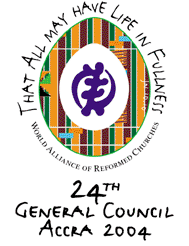
2004 Accra Assembly Program
The groaning of creation under the assault of environmental degradation and the groaning of people under the assault of economic globalization policies that create deep suffering and deal death – these make up the two major themes of the Accra Confession, a statement of the World Alliance of Reformed Churches in 2004. The Confession states that issues of economic and environmental justice are not just political issues – rather, they are definitional to the Gospel and impact the church’s witness. The church, including those who come from rich countries and those who do not, is called to unity in the work for justice for people and the earth. Accra names the sin of the way the world’s economy and approach to creation are set up – that the system is not broken, but rather, it is operating in the way it was built – and calls the church to stand against this sin.
Emerging from decades of violent struggle and tragic bloodshed, the Kairos Palestine document is another confession from below. Written by Christian leaders in Palestine living under military occupation, it calls to the church in the world to stand in solidarity with those who suffer. The document spends much time on the persistence of Christian hope. It is a “cry of hope in the absence of all hope”. It outlines the reality of Palestinian suffering, noting the separation wall, unjust imprisonment of many, the lack of religious liberty, the continuing growth of Israeli settlements on Palestinian land, and the status of the city of Jerusalem. It names resistance as faithfulness, and explores the meaning of the mission of the church. Study of Kairos Palestine is needful for anyone seriously considering confessing truth.
In my final post later this week, I suggest some guidelines for those feeling called to confess truth in our time.
[1] See Goen, C.C. Broken Churches, Broken Nation: Denominational Schisms and the Coming of the Civil War. Macon, GA: Mercer University Press, 1985. The Methodist, Baptist, and Presbyterian Churches split over slavery between 1830 and 1860; the Presbyterians experienced schism twice in this period.
[2] No Dakota Access Pipeline
[3] Both books are available free of charge as downloadable pdf files from the website of the Presbyterian Church (U.S.A.), www.pcusa.org. Except where otherwise noted, Confessions cited in this essay are included in the PCUSA Book of Confessions.
[4] The Confession of 1967, Book of Confessions 9.01-9.02

